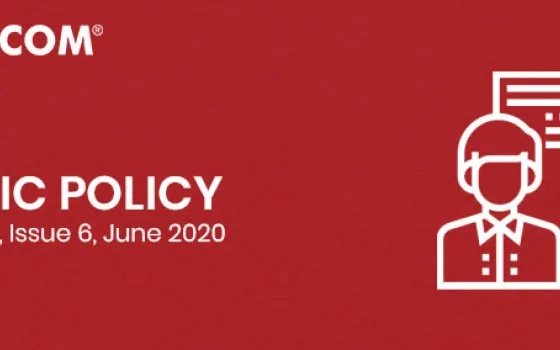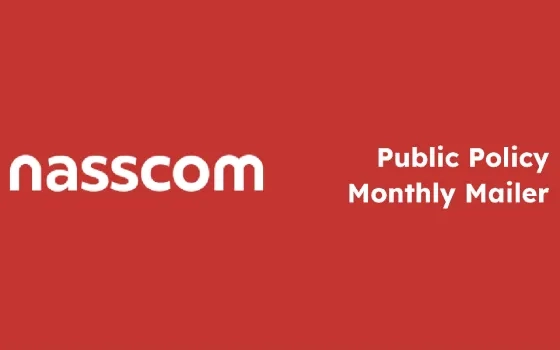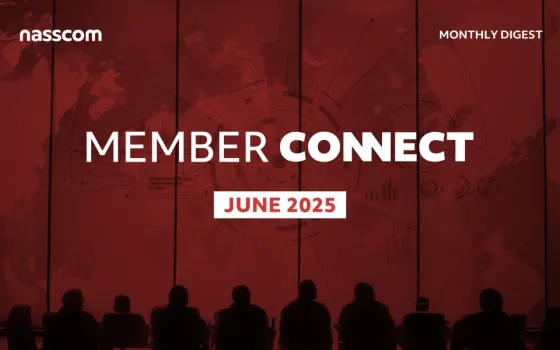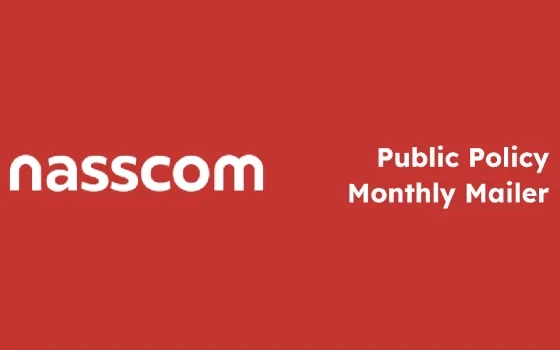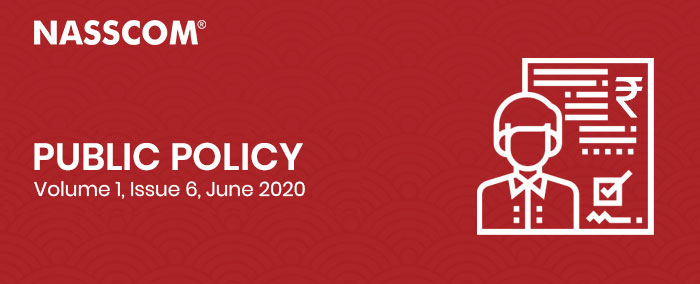 |
| |
| |
| |
| |
COVID-19: GOVERNMENT ADVISORIES AND OTHER ESSENTIAL INFORMATION |
|
| |
| |
All information relating to NASSCOM’s engagement with the Government is available on the NASSCOM Community Page under ‘Policy Advocacy’. Latest advisories from the Central Government and State Governments including information on availing State passes for movement of goods are available on NASSCOM’s Covid19 Advisories Dashboard |
|
| |
|
| |
|
|
|
| |
| In Focus – Covid-19 Relief Measures |
| |
 |
| |
|
| Covid-19 Related Policy Updates |
|
|
| |
| |
| |
| |
 |
|
EPFO: Reduction in PF contribution rates announced by Govt |
|
| |
| |
|
|
 |
|
| |
| |
|
|
In a move to aimed at enhancing liquidity for employees, and providing relief to employers in light of the disruption caused by Covid-19, the Government notified a reduction in the statutory contribution rate for Employee’s Provident Fund (EPF) from 12% to 10% for the period of three months i.e. May 2020 to July 2020. Based on member queries, NASSCOM reached out to the Employees Provident Fund Organization (EPFO) to seek clarity on whether despite the reduction in EPF rate to 10%, employers and employees would have the option of making a higher contribution. Responding to NASSCOM’s query, the EPFO later issued detailed FAQs confirming that notwithstanding the reduction in EPF rates, the employer, or employee, or both, retained the option of making a higher contribution (read more). |
|
| |
|
| |
| |
| |
 |
|
EPFO: ECR filing process eased |
|
| |
| |
|
|
 |
|
| |
| |
|
|
Given the impact of the Covid-19 on employers, the EPFO has introduced changes in the Electronic-Challan cum Return (ECR) filing process. As per EPFO’s Press Release dated 30 April 2020, ECR can now be filed by an employer without the need of simultaneous payment of contributions, and that the employer’s contributions may be paid later at the employer’s convenience after filing the ECR.The EPFO clarified that filing of ECR shall be treated as employers intent to comply, and will not attract any penal consequences (read more). |
|
| |
|
| |
|
|
|
| Covid-19 Related Policy Submissions |
|
|
| |
| |
| |
| |
 |
|
State Governments: NASSCOM seeks relaxations from labour regulations |
|
| |
| |
|
|
 |
|
| |
| |
|
|
Even prior to the ongoing Covid-19 crisis, NASSCOM has consistently advocated the need for labour laws that provide an enabling framework for the knowledge economy, especially given the significant differences between knowledge economy firms, and firms in the traditional manufacturing sector, or such other firms subject to State-level shops and establishments legislation. Given the impact of Covid-19 on businesses, several State governments (MP, Gujarat, UP, Maharashtra etc.) have recently announced temporary relief measures from a labour law perspective. Such measures have been targeted towards providing the industry with flexibility in terms of working hours, overtime restrictions, etc. Given that the IT industry is equally impacted, NASSCOM requested these Governments to consider key changes in policies that are needed to enable the new workplace model and enable both the employer and employee to navigate the current crisis as well as prepare for the future. The recommendations on changes in labour laws include some short term measures like a temporary furlough scheme, exemption from apprentice act and some broader changes to defined working hours, leave policy, night shift obligations when employees work from home, self-declaration on compliances, etc. |
|
| |
|
| |
| |
| |
 |
|
State Governments: Financial support to IT-ITeS SMEs |
|
| |
| |
|
|
 |
|
| |
| |
|
|
Clients of the Indian IT-ITeS industry, world over, have been severely impacted by the pandemic. As a consequence, IT-ITeS companies are already facing delays in payments due from their customers. This trend is expected to worsen in the near future as companies conserve cash to tide through the crisis. This has significantly impacted the industry’s, and particularly SME’s, ability to support employees and meet their essential expenses for the next 6 months. Therefore, NASSCOM engaged with the Governments of Telangana, Maharashtra and West Bengal seeking financial support for the SMEs. Rent waiver for companies in Government owned IT premises, waiver of property tax, financial support to cover part of the wage cost, subsidized power, etc. are some of the key requests made to the Government. |
|
| |
|
| |
| |
| |
 |
|
Ministry of Finance: Request to consider revision in Advance Pricing Agreements (APAs) and mark-ups under Safe Harbour Rules |
|
| |
| |
|
|
 |
|
| |
| |
|
|
The Covid-19 pandemic and the resulting economic slowdown has had ripple effects across a range of markets, thereby hampering Multinational Enterprises (MNEs)‘s operations, upsetting corporate forecasts and business plans. Given the consequent changes to operations/assumptions, there is a need for revision of Advance Pricing Agreements (APAs). In order to enable revision of APAs, NASSCOM has requested the Central Board of Direct Taxes (CBDT) to issue a Circular providing detailed guidance on the subject which includes eligibility, timing and process for making requests for revising APAs. We have also requested CBDT to re-notify revised Safe-Harbour Rules (SHR) for Financial Year (FY) 2020-21 with rationalized and substantially lower mark-ups in line with current trends, specifically with regard to service providers (read more). |
|
| |
|
| |
| |
| |
 |
|
MeitY: Policy recommendations for enabling Work From Home |
|
| |
| |
|
|
 |
|
| |
| |
|
|
A sustained transition to Work-from-Home (WFH) will significantly rely upon a good WFH strategy and its able execution. Just like human resource and management practices evolved to deal with large firms, rules surrounding remote work across a scattered work force, will need to evolve to deal with WFH. There is a unique opportunity for the industry and the Government to carefully analyse and encourage WFH and build up effective implementation strategies. In this context, NASSCOM has submitted a note to the Ministry of Electronics and Information Technology (MeitY) highlighting policy recommendations for enabling work from home in the longer run (read more). |
|
| |
|
|
|
| |
|
|
|
| |
| |
| |
| |
 |
|
NASSCOM-Trilegal Webinar on ‘Returning to the Workplace Post the Lockdown in India: Formulating Workplace Preparedness and Resiliency Plans’ |
|
| |
| |
|
|
 |
|
| |
| |
|
|
04th May 2020 |
| |
| |
|
|
NASSCOM in association with Trilegal organized a webinar on ‘Returning to the Workplace Post the Lockdown in India: Formulating Workplace Preparedness and Resiliency Plans’. The objective of the webinar was to discuss and create awareness on employers’ legal obligations post lockdown and challenges related to business continuity and employee health and safety. Overall 400+ industry members participated in the webinar. Click here to view the recording. |
|
| |
|
| |
| |
| |
 |
|
NASSCOM-DSCI Webinar on Export Compliance for Cybersecurity Start-ups and Companies |
|
| |
| |
|
|
 |
|
| |
| |
|
|
06th May 2020 |
| |
| |
|
|
NASSCOM and DSCI organized a webinar on export compliance for cybersecurity start-ups and companies. The session gave an overview of export control regime in India, especially the SCOMET List and export license exceptions. The webinar was part of NASSCOM’s outreach program to educate start-ups which export dual-use goods and technology on their legal and compliance obligations under export control laws in India (read more). |
|
| |
|
| |
|
|
|
| Non-Covid19 Related Policy Submissions |
|
|
| |
| |
| |
| |
 |
|
Ministry of Commerce: Representation seeking extension of SEIS |
|
| |
| |
|
|
 |
|
| |
| |
|
|
NASSCOM wrote to the Ministry of Commerce (MoC) reiterating its request to notify the Service Exports from India (SEIS) scheme for the benefit of service exporters in FY 2019-20. In addition, we suggested that scheme should be redesigned to include new emerging technologies and other services which have significant export and employment potential. |
|
| |
|
| |
| |
| |
 |
|
Ministry of Finance: Issues requiring clarifications, guidance on the new Equalisation Levy |
|
| |
| |
|
|
 |
|
| |
| |
|
|
The recent amendments to the provisions dealing with Equalisation Levy (EL) significantly increase the scope of EL. Subsequent to the amendments, EL @ 2% is applicable on consideration received/ receivable by non-resident e-commerce operators on e-commerce supply or services made or provided or facilitated by it, effective April 1, 2020. However, several concerns and interpretational challenges in relation to the EL amendments remain for the E-commerce industry, making it difficult for the industry to comply with the provisions. NASSCOM made a representation to Ministry of Finance (MoF) highlighting issues where clarification/ guidance is required from the Government, and requested MoF to consult the industry as part of the process of addressing the issues.(read more).
In this regard, a meeting was also organised by Department for promotion of Industry and Internal Trade (DPIIT). During the meeting, NASSCOM highlighted issues arising as a result of broad scope of EL and other aspects which require clarification from the government. After the meeting, we specifically communicated to DPIIT that due to the reasons cited in the meeting and ongoing Covid-19 disruptions, the levy is not in the interest of the industry or the consumers and should in-fact be reviewed.
|
|
| |
|
| |
| |
| |
 |
|
MeitY: Data Centre Policy |
|
| |
| |
|
|
 |
|
| |
| |
|
|
The Finance Minister in the Budget speech this year proposed bringing out a policy to enable the private sector to build data centre parks in India. In response to this announcement, NASSCOM sought suggestions from the industry and formed a 10 member Data Centre Policy Taskforce, comprising of senior industry leaders, to deliberate the suggestions and arrive at recommendations that can help promote the growth of Data Centres in India. The recommendations were submitted to the MeitY, and further industry consultation involving MeitY is awaited (read more). |
|
| |
|
| |
| |
| |
 |
|
DGFT: Representation on Extending SCOMET Authorisation Period |
|
| |
| |
|
|
 |
|
| |
| |
|
|
NASSCOM submitted a representation to the Directorate General of Foreign Trade (DGFT), with a request to extend the validity period of all export authorisation of items specified under the Special Chemicals, Organism, Materials, Equipment and Technologies (SCOMET) list, which are expiring between March and June 2020, by four months. The representation highlighted that given the unprecedented challenges due to the ongoing pandemic, industry may find it difficult to meet the requirements of applying for revalidation of SCOMET authorisations expiring between March and June 2020 in the absence of such an extension. (read more). |
|
| |
|
| |
| |
| |
 |
|
Labour Reforms: Representation on ‘The Occupational Safety, Health and Working Conditions Code, 2019’ |
|
| |
| |
|
|
 |
|
| |
| |
|
|
NASSCOM earlier this month made a representation to the Government on the proposed Occupational, Health and Working Conditions Code, 2019 (Code). In our representation, we suggested registration under State-specific Shops and Commercial Establishment Acts (SCEA), should be treated as deemed registration under the Code and such employers should not be required to obtain registration. This should assist towards reducing the administrative burden. Similarly, we suggested that obligation to maintain and setup facility for treatment of waste and effluent should be on the owner or operator of the infrastructure and not on tenant. We also suggested that principal employer should not be made accountable for any default by the contractor (read more). |
|
| |
|
| |
| |
| |
 |
|
MeitY: Submission on National Open Digital Ecosystems (NODE) |
|
| |
| |
|
|
 |
|
| |
| |
|
|
As part of MeitY’s ongoing consultation process on the proposed National Open Digital Ecosystems (NODE) approach to digital transformation of the Government, NASSCOM submitted its recommendations in response to MeitY’s White Paper on the subject. We recommended that the Government should aim to develop the core blocks of the NODE and seek to develop an ecosystem where the industry is able to develop and operate the services through business models which ensure that the NODE continues to develop and pay for itself. Many of the use cases discussed in the consultation paper can be considered as good examples for transformation into a NODE in a manner where the potential is fully developed.
Sectors of governmental intermediation where a state entity is involved just for ledger maintenance or collecting state dues but is not adding value to the transaction can be relooked to assess how government’s role can be redefined in those sectors. In this context, government should evaluate use of blockchain technology in applications such as land-record and title management, payment systems, education certification management, immunisation supply chain management, etc. for unlocking the potential of NODE. Overall, we have recommended use of open source software, open APIs and open standards.
The recommendations stressed that realising the potential of NODE will require appropriate incentives within the different departments of the Government to not only implement GovTech 3.0 but to implement it well. (read more)
|
|
| |
|
| |
|
|
|
|
|
| |
| |
| |
| |
 |
|
Discussion Paper on Amendments to the Information Technology Act, 2000 |
|
| |
| |
|
|
 |
|
| |
| |
|
|
NASSCOM will be releasing a discussion paper on proposed amendments to the Information Technology Act, 2000 (IT Act). This is in light of MeitY’s ongoing review of the IT Act to address regulatory challenges posed by emerging technologies. For more information, contact komal@nasscom.in and dagarwal@nasscom.in. |
|
| |
|
| |
| |
| |
 |
|
Discussion Paper on ‘Future Ready SEZ Policy for IT-BPM Industry’ |
|
| |
| |
|
|
 |
|
| |
| |
|
|
SEZ policy has been an important driver of growth for the IT-BPM sector in terms of revenue and employment generation. NASSCOM will be releasing a discussion paper with an objective to highlight the current gaps in the existing SEZ policy and what is needed to make ensure the SEZ remains attractive for the industry. For more information, contact deepak@nasscom.in and tejasvi@nasscom.in. |
|
| |
|
| |
| |
| |
 |
|
Discussion Paper on Regulating Encryption in India |
|
| |
| |
|
|
 |
|
| |
| |
|
|
In 2013, the Snowden revelations, led to worldwide public condemnation of the non-transparent and unbridled surveillance programs employed by the US government to spy on its citizens, and at the same time put the spotlight on the importance of encryption technologies in protecting citizen’s privacy. In the wake of the Snowden leaks, the Indian government moved to prescribe an overarching encryption framework when it formulated an ambitious draft National Encryption Policy in 2015. The initiative however was swiftly rolled back due to various contentious provisions.
Today, issues of privacy and State access to information online, are back in sharp focus. Multiple initiatives, including a review of the IT Act and rules prescribed therein (including rules applicable to intermediaries, deploying encryption), and the proposed Personal Data Protection Bill, 2019, have necessitated a closer look at encryption technologies, and the ways in which regulatory frameworks attain a balance between citizens’ informational privacy and State’s access to information.
In this context, NASSCOM will soon be releasing its Discussion Paper on Regulating Encryption in India, focusing on potential solutions for bringing in greater certainty to the use and deployment of encryption technologies across Peer-to-Peer, and enterprise applications. For more information, contact indrajeet@nasscom.in and dagarwal@nasscom.in.
|
|
| |
|
| |
|
|
|
|
|
| |
| |
| |
| |
 |
|
Request for Inputs on GST issues faced by IT-BPM Industry |
|
| |
| |
|
|
 |
|
| |
| |
|
|
NASSCOM periodically submits a consolidated memorandum to GST Council highlighting key issues faced by member companies in respect of GST across India (the last such representation was submitted in January 2020). We are now in the process of identifying other issues that need Government intervention, with a view to submitting the same to the GST Council and the Government. In this context, we would request you to share your inputs/ suggestions before June 30, 2020 (read more). |
|
| |
|
| |
|
|
|
|
|
| |
| |
| |
| |
 |
|
CBDT: Safe Harbour Rules for AY 2020-21 Notified |
|
| |
| |
|
|
 |
|
| |
| |
|
|
The CBDT, vide issue of Income Tax (9th Amendment) Rules, 2020 has notified SHR for Assessment Year (AY) 2020-21. As per the notification, rates applicable from AY 2017-18 to 2019-20 will continue to apply for AY 2020-21. This is in line with NASSCOM’s recommendation as part of Pre-Budget Memorandum submitted to Ministry of Finance in December 2019. (read more). |
|
| |
|
| |
| |
| |
 |
|
Ministry of Finance: Clarifications relating to applicability of Section 269SU of the Income Tax Act in B2B transactions |
|
| |
| |
|
|
 |
|
| |
| |
|
|
The Government issued a clarification vide notification no. 12/2020 dated 20 May 2020, stating that provisions of section 269SU of the Income Tax Act, 1961, shall not be applicable to a specified person having only B2B transaction s (i.e. no transaction with retail customer/consumer) if at least 95% of aggregate of all amounts received during the previous year, including amount received for sales, turnover or gross receipts, are by any mode other than cash. This comes after NASSCOM made a representation to the CBDT and Department of Revenue, Ministry of Finance highlighting the issues faced by the IT industry due to prescribed electronic modes (Read more). |
|
| |
|
| |
|
|
|
| |
|
|
|
|



